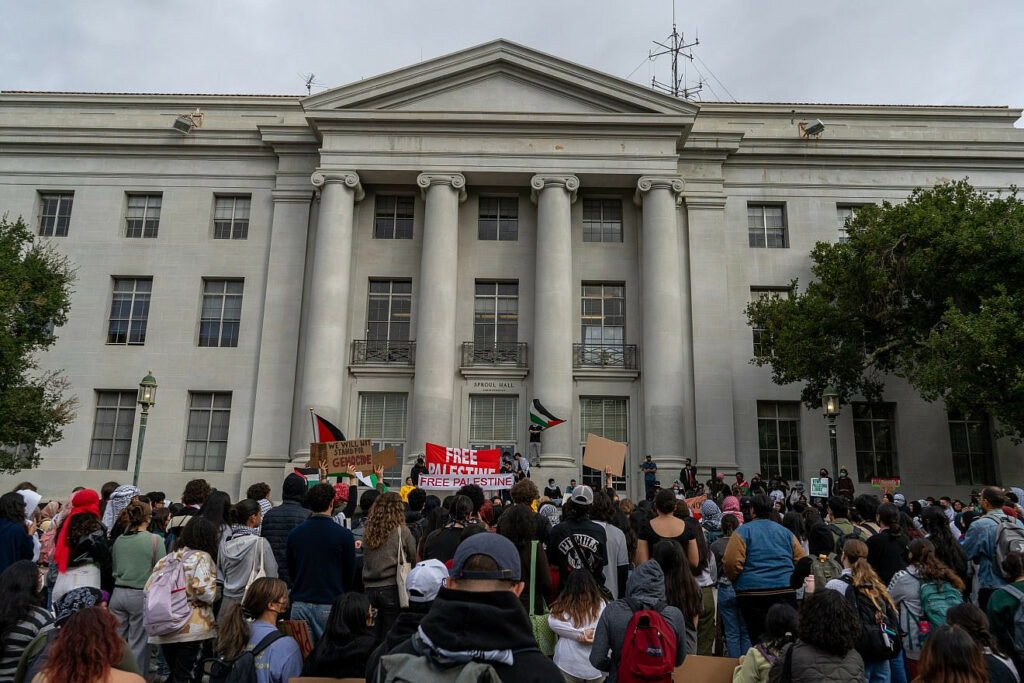
Why is Biden pushing for an immoral hostage deal?
Pressure on Israel to agree to pay an exorbitant ransom for the hostages that will grant victory to Hamas isn’t just politically motivated. It’s a betrayal of American interests
A late-night comedy show isn’t the place you generally go for insights on the prospects for stability in the Middle East. But the appearance this week of President Joe Biden on NBC’s “Late Night with Seth Meyers” gave us more than just another example of the broadcast network’s daily in-kind contributions to the Democrats and Biden’s re-election campaign.
The fawning interview served up softballs to the 81-year-old president, intending to undermine concerns about his age and declining abilities. It also served as an opportunity for him to tell us just what the United States stands for in international affairs. The fuzzy rhetoric of the president about being a “Zionist” notwithstanding, his statements about what he wants to happen in the Middle East showed that he was primarily interested in currying favor with his party’s intersectional left wing that despises Zionism and that is well-represented in Hollywood. Working to ensure that Islamist terrorists no longer pose a threat to Israelis or Americans wasn’t high on his “To Do” list.
That was evident in his comments about the imperative for a ceasefire in the current war against Hamas as part of a deal to free Israeli hostages, for Israel to halt its campaign to eradicate the last strongholds of Hamas in Gaza and to pause the fighting before the start of Ramadan. It was also inherent in his insistence that the Palestinians should be rewarded for the Oct. 7 massacres with a diplomatic process that will lead to statehood that they don’t want, but which they can use to continue their genocidal campaign to destroy the one Jewish state on the planet.
An immoral hostage deal
For nearly five months, the Jewish world has been calling for the release of hostages taken by Hamas during the Oct. 7 massacres in southern Israel—all of them. Indeed, the freedom of the hostages is one of Israel’s two main war goals alongside the elimination of Hamas. But as ongoing negotiations for the release of the more than 100 Israelis still being held captive by Hamas in Gaza continue with flurries of diplomatic activity involving the United States, as well as Hamas’s ally Qatar, something is missing from the discussion of the proposed terms for such a deal. And that is a moral compass.
Trading the lives of innocent Israeli civilians who were kidnapped from their homes amid an orgy of mass slaughter, rape and torture that took place on Oct. 7 for the release of Palestinians who have been convicted of acts of violence against Jews, including murder, is a bizarre and immoral concept that has already become normalized. Indeed, it is Israel’s government that has done more to normalize this idea because of its record of paying exorbitant prices to free Israelis held by terrorists. The most recent was in 2011, when Jerusalem traded 1,027 prisoners, including hundreds with Jewish blood on their hands, to gain the release of Gilad Shalit, a young soldier who had been kidnapped by Hamas in 2006. That decision by Prime Minister Benjamin Netanyahu now hangs over the current negotiations as not just a terrible precedent but a benchmark of extortion that Hamas—and its foreign enablers—believe can be made to look as if it were a bargain.
That’s because Israel is reportedly willing to trade large numbers of terrorists for each individual hostage with the number of female Israelis held captive by Hamas (undergoing who knows what torment at their hands) being especially high. The hostage releases are supposedly also going to be strung out over weeks as part of a process in which Hamas can play with the emotions of Israeli families as they hope and pray that their relatives will be let go—and that they are among those still alive (dozens of those still unaccounted for are believed to be dead). Hamas doesn’t want to include captured soldiers, particularly female soldiers, in the early stages of the deal, preferring to hold them as bargaining chips for even higher prices. The terror group that ruled Gaza as an independent state in all but name until Oct. 7 also wants many of the terrorists released to return to the Strip, thus giving them the opportunity to kill more Jews.
More than that, each hostage released, in addition to terrorists freed, will gain Hamas a day of halted fighting and increased supplies to go into the parts of Gaza controlled by the Islamist group. As such, the freedom of Israelis will not just ensure that Palestinians who have committed acts of violence will evade justice; it will mean that the terrorist group itself—pledged to the destruction of Israel and the genocide of its population—is the main beneficiary of the deal. It will be allowed to regroup, resupply and prepare to continue its war on the Jews.
With Biden promising to treat any pause in combat as an excuse to work for a permanent ceasefire, the main outcome of the next hostage deal (and there inevitably will be another) will be not so much an egregious act of extortion as a political victory for Hamas that will solidify its hold on Gaza and its place as the preeminent voice of the Palestinian people.
Pressure on Netanyahu
We know that as far as the families of the hostages are concerned, no price is too high to pay for their loved ones. They are fully entitled to advocate for a deal at any price, and no one should blame them for doing so. Who wouldn’t trade the whole world to save our children or other relations?
(source: JNS)
It’s true that the campaign inside Israel to pressure Netanyahu to accede to Hamas’s terms is inextricably tied to the country’s politics. To listen to the speeches at weekly Saturday-night rallies in Tel Aviv’s “Hostages Square,” as I did recently, you’d think it was Netanyahu and not Hamas who was the kidnapper, and that he was holding them in his basement rather than desperately waging military and diplomatic campaigns to free them from captivity inside the Islamist group’s remaining tunnel strongholds.
But as sensitive as the prime minister is to that kind of political pressure, the most worrisome aspect of the effort to force Israel to halt the war against Hamas is not coming from within the Jewish state but from its closest ally.
If the reported terms of a hostage deal—the prospects for which seem to change every day, if not every hour—are true, then it’s an astonishing result that ought to give everyone in the civilized world pause. The hostages are important. Still, those tasked with keeping the world safe from terrorism and working against forces that threaten the stability of the Middle East should not just be appalled by the terms, even if they mean freedom to the hostages. They should be actively using all of their political, military, economic and diplomatic leverage to ensure that it doesn’t happen. A Hamas victory in the war, sealed by a hostage deal, would not simply be a defeat for Israel but a devastating blow to the interests of the United States with implications that go far beyond the conflict with the Palestinians.
American interests at stake
Yet it is exactly the outcome that the president of the United States seems most interested in achieving.

Hamas’s leverage would ordinarily only depend on the number of hostages it holds. But in these negotiations, it has other assets. It has an international movement of sympathizers—wittingly and unwitting—and an American government that is more eager to end the war than to eliminate the group that started it with unspeakable atrocities on Oct. 7.
Biden has been at pains to appease those voters who support Hamas. The results of the Michigan Democratic primary this week, in which 13.2% of voters cast ballots as “uncommitted,” will only heighten the pressure on him to do more to please those who regard the terrorist group’s survival as an imperative.
In an act of unintended irony, during his late-night appearance, he claimed that his likely opponent in November—former President Donald Trump—was the candidate of “old ideas” that were discredited. Yet Biden’s position on the Middle East and his insistence that Israel must, sooner or later for the sake of its “survival,” accept a two-state solution is the oldest and most discredited policy option that could be imagined. At this point, it’s not just something that has been tried and failed repeatedly. Palestinians have made it clear they have no interest in a state if it means living in peace next to a Jewish one.
It’s bad enough that Biden still pretends, by every measure of public opinion notwithstanding, that Hamas isn’t broadly popular and representative of the Palestinian people. That’s made all the more egregious by his comments to Myers, in which he called for the toppling of Netanyahu’s democratically elected government because it’s “incredibly conservative.”
It’s also absurd that Biden pretends that the whole world is behind Israel but that it will lose that support unless it stops its campaign against Hamas due to Palestinian casualties falsely labeled as “genocide,” which are regrettable but only continue because the terrorists refuse to surrender. This is much like the Nazis—whose ideology is echoed in Hamas’s goals—in the last days of World War II as they preferred to see Germany destroyed and its people slaughtered rather than concede to the inevitable. His talk of the need for a holiday pause for Ramadan is equally off-base since no one in the international community seems to think it was wrong for Hamas to start a war on the Jewish holiday of Simchat Torah.
Israelis have their own reasons for their views on a hostage deal. Some will support it because of their sympathies for the hostages and their families, or because they think it will hurt Netanyahu. Others oppose it because it will likely mean more Jewish bloodshed in the future. But American interests are also involved. This is a deal that will not just grant a victory to the perpetrators of the largest mass murder of Jews since the Holocaust; it will mean that Hamas would exist as the main force in Palestinian politics for the foreseeable future with unknowable consequences for regional stability. It will be a gift to their Iranian funders and allies elsewhere, like the Houthis, who are threatening the global economy because of Biden’s foolish pre-Oct. 7 appeasement of Iran. Above all, in a world in which the United States still plays an irreplaceable role as the defender of Western values and security, the eagerness with which Biden is pursuing this amoral deal is a measure of just how far American foreign policy has fallen on his watch.
Jonathan S. Tobin is editor-in-chief of JNS (Jewish News Syndicate). Follow him: @jonathans_tobin.
**This article was originally published on JNS.org**
The post Why is Biden pushing for an immoral hostage deal? appeared first on Israel365 News.
Israel in the News